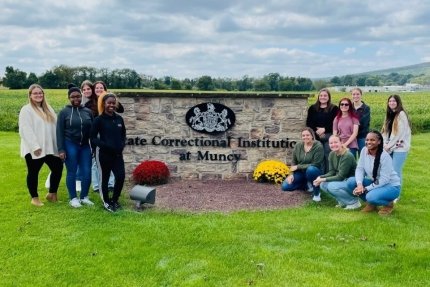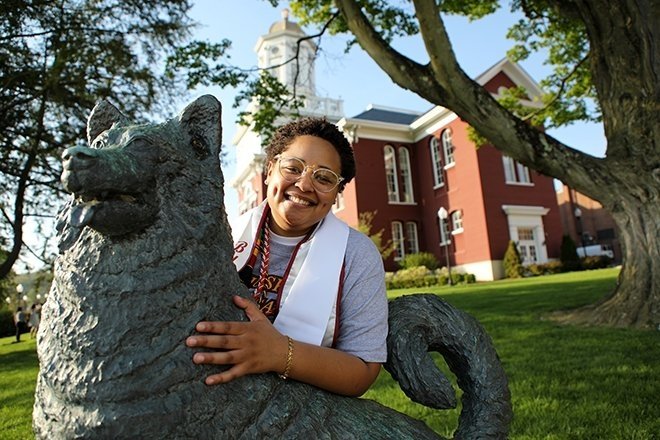
Criminal Justice
Are you ready for the challenge? Get prepared for a career in criminal justice and the legal systems, as well as entry into graduate or law school.
- Degrees & Offerings
-
- A.S.
- B.S.
- Location
-
- Bloomsburg
- Clearfield
- Lock Haven
- Mansfield
- Online
- Program Contact
-
Chair of the Department of Anthropology, Sociology, Criminal Justice, and Social Work / Assistant Professor of Criminal Justice
Through a career-focused curriculum, you'll learn the fundamentals of criminology and criminal justice systems and explore the latest trends and contemporary issues in crime and criminal justice.
As one of the most popular majors at Commonwealth University, criminal justice brings together people interested in pursuing an academic and professional career in criminology, law enforcement, homeland security, juvenile justice system, corrections, courts, victimology, criminal investigation, criminal law, and other fields under the broad coverage of criminal justice.
Criminal Justice (B.S.) Program Overview

- Applied Learning: Through a combination of classroom study and experiential learning, you will gain an understanding of crime and deviance and criminal justice organizational systems while acquiring the ability to analyze and critique emerging research and current trends. Topics covered include major areas of the criminal justice system, as well as special topics such as Victimology, White Collar, Crime, Media and Crime, Women and Crime, American Gangs, Criminal Investigation, and Conservation Law Enforcement concentration.
- Act 120 Municipal Police Academy Pathway Program: Only at Commonwealth University! You can earn a Bachelor of Science degree in Criminal Justice and Act 120 certification to work as a municipal police officer in Pennsylvania in four years. All CU locations, in association with the Mansfield Public Safety Training Institute, offer the Act 120 pathway program.
- Conservation Law Concentration: Specifically designed to prepare you for competitive employment in a variety of settings related to conservation, management, and protection of our natural resources, species, and habitats. Topics covered include: Conservation Law Enforcement, Environmental Justice, Environmental Sociology, Environmental Issues and Choices, Environmental Conservation and Preservation, and Environmental Sustainability and Humanity.
- Customize Your Education: Customize your education and create additional career options through a selection of minors and double majors like Pre-Law, Languages and Cultures, Political Science, Social Work, Sociology, or Psychology.
- Graduate School Options: Continue your climb in one of our graduate programs like the Master's of Social Work, M.S. Clinical Mental Health Counseling, and Master's of Business Administration. Our graduate programs can enhance your existing skills and knowledge as a criminal justice major, increase your earning power, and prepare you for a leadership role in your field.
A.S. in Criminal Justice
The A.S. in criminal justice is specifically designed to prepare you for entry-level positions, which do not require a four-year degree. You will take a limited number of discipline-specific courses and two courses of your choice. All coursework completed toward the A.S. is transferrable to the B.S. in criminal justice.
Course Delivery Format
Bloomsburg
Face-to-Face
Online
Hybrid
Lock Haven
Face-to-Face
Online
Hybrid
Mansfield
Face-to-Face
Online
Hybrid
Clearfield
Face-to-Face
Online
Hybrid
Courses and Curriculum
Our criminal justice faculty are strong academics with practical experience in law and criminal justice professions, which they share in the classroom and through advising. In addition, the faculty are active researchers, as well as expert sources for local, state, and national media. They have specializations and experience in criminology, crime investigation, criminal justice policies, criminal justice administration, cybercrime, law enforcement, correction, juvenile justice, terrorism and homeland security, social work, international criminal justice institutions, conservation law enforcement, and more.
Degree Requirements (A.S.) Degree Requirements (B.S.) Degree Works
Note: Degree requirements effective for enrolled students beginning Fall 2023. All enrolled students, including matriculating students prior to Fall 2023, can review their degree program requirements and track progress to degree completion with our degree audit and advisement tool, Degree Works.
The Commonwealth University Criminal Justice program offers a concentration in Conservation Law Enforcement. This concentration is specifically designed to prepare students for competitive employment in a variety of settings related to conservation, management, and protection of our natural resources, species, and habitats.
Topics covered include
- Conservation Law Enforcement
- Environmental Justice
- Environmental Sociology
- Environmental Issues and Choices
- Environmental Conservation and Preservation
- Environmental Sustainability and Humanity
The Conservation Law Enforcement concentration is available at the Bloomsburg, Lock Haven, Mansfield, and Clearfield locations of Commonwealth University.
Degree Requirements Degree Works
Note: Degree requirements effective for enrolled students beginning Fall 2023. All enrolled students, including matriculating students prior to Fall 2023, can review their degree program requirements and track progress to degree completion with our degree audit and advisement tool, Degree Works.
Through this certificate program we provide education, training, and a foundation for achieving two-year and four-year degrees in preparation for employment in high-demand fields with above-average job market growth in rural, suburban, and urban communities.
This program is only offered to inmates in PA State Correctional Institutions. Those interested in enrolling in the certificate program should contact their guidance counselors.
Upon completion of the B.S. Criminal Justice degree program, students will be able to:
- (History): Describe the history and legal development of the criminal justice system and relate the impact of historical forces to the current roles of the police, courts, and corrections in administering justice.
- (Communication): Construct coherent arguments, narratives, or explications of issues, problems, or processes to achieve shared understanding of meaning depending on the effective use of language across multiple expressive modes including digital platforms.
- (Ethics): Describe basic ethical reasoning perspectives, articulate the origins of personal core beliefs, and critique the influence of ethical perspectives on issues within the criminal justice system.
- (Diversity): Identify the ways in which power differentials operate, are experienced, and are reinforced at individual, group, community, institutional, and global levels and how they impact the criminal justice system.
- (Theory): Compare and contrast criminological theories to evaluate the causes/correlates of crime as well as how society perceives and responds to criminal behavior.
- (Research): Propose a researchable question, identify relevant sources in the academic literature, and formulate hypotheses to explain the causes and correlates of criminal behavior.
- (Analysis): Interpret data and apply appropriate analytical techniques to critique criminological research and public policy.
Upon completion of the B.S. Criminal Justice degree program with a concentration in Conservation Law Enforcement, students will be able to:
- (History): Describe the history and legal development of the criminal justice system and relate the impact of historical forces to the current roles of the police, courts, and corrections in administering justice.
- (Communication): Construct coherent arguments, narratives, or explications of issues, problems, or processes to achieve shared understanding of meaning depending on the effective use of language across multiple expressive modes including digital platforms.
- (Ethics): Describe basic ethical reasoning perspectives, articulate the origins of personal core beliefs, and critique the influence of ethical perspectives on issues within the criminal justice system.
- (Diversity): Identify the ways in which power differentials operate, are experienced, and are reinforced at individual, group, community, institutional, and global levels and how they impact the criminal justice system.
- (Theory): Compare and contrast criminological theories to evaluate the causes/correlates of crime as well as how society perceives and responds to criminal behavior.
- (Research): Propose a researchable question, identify relevant sources in the academic literature, and formulate hypotheses to explain the causes and correlates of criminal behavior.
- (Analysis): Interpret data and apply appropriate analytical techniques to critique criminological research and public policy.
Upon completion of the A.S. Criminal Justice degree program, students will be able to:
- (History): Describe the history and legal development of the criminal justice system and relate the impact of historical forces to the current roles of the police, courts, and corrections in administering justice.
- (Communication): Construct coherent arguments, narratives, or explications of issues, problems, or processes to achieve shared understanding of meaning depending on the effective use of language across multiple expressive modes including digital platforms.
- (Ethics): Describe basic ethical reasoning perspectives, articulate the origins of personal core beliefs, and critique the influence of ethical perspectives on issues within the criminal justice system.
- (Diversity): Identify the ways in which power differentials operate, are experienced, and are reinforced at individual, group, community, institutional, and global levels and how they impact the criminal justice system.
- (Theory): Compare and contrast criminological theories to evaluate the causes/correlates of crime as well as how society perceives and responds to criminal behavior.
- (Research): Propose a researchable question, identify relevant sources in the academic literature, and formulate hypotheses to explain the causes and correlates of criminal behavior.
- (Analysis): Interpret data and apply appropriate analytical techniques to critique criminological research and public policy.
Upon completion of the 24-credit certificate in Rehabilitative Justice, students will be able to:
- Articulate the value of multidisciplinary approaches to knowledge and problem solving.
- Compose written documents for particular audiences, purposes and genres.
- Identify cultural differences in written, verbal and nonverbal communication and apply that understanding in a peer support environment.
- Apply multidisciplinary social science principles in academic and peer support environments.
- Apply critical thinking and problem solving skills to academic and peer support situations.
- Apply theories, techniques and strategies of chemical dependence in a peer support environment.
- Determine basic psychological concepts, vocabulary, and principles concerning personal adjustment, coping, and emotional awareness, and apply them in a peer support environment.
Experiential Learning
Students have the option to choose an internship for their capstone experience. Internships are not required, although recommended. You and your advisor will work together to find an internship placement that is right for you. Examples of recent internship placements include:
- Ocean City Maryland Police Department
- Clinton County Prison
- Private Law Firms
- Clinton County Children and Youth Services
- Clinton County Probation and Parole
- Clinton County Housing Authority
- State College Police Department
- Clearfield Sheriff's Department
- Pennsylvania State Probation and Parole
- PA State Correctional Institutions
- PA Game Commission
- City of Philadelphia
- Columbia County Victim/Witness Program
- Delaware County District Attorney’s Office
- Harrisburg Police Bureau
- North Central Secure Treatment Center
- PA Board of Probation & Parole (Allentown)
- State Correctional Institute (Muncy)
- Wilkes-Barre Police Department
- Clearfield Regional Police Department
- Clearfield County Children and Youth Services
- Tioga County Probation
- Tioga County Prison
Our students are prepared for many unique pathways, including graduate school. Criminal Justice students at CU have went on to study at:
- Arizona State University – M.S., Forensic Psychology
- Arizona State University – M.S., Community Resources and Development
- Indiana University of PA – M.A., Criminology
- Marymount University – M.S., Forensic and Legal Psychology
- St. Joseph’s University – M.S., Criminal Justice
- University of Cincinnati – M.S., Criminal Justice
- University of Miami College of Law
- University of Michigan College of Law
The thorough, rigorous curriculum at Commonwealth University prepares students to work in the field. Alumni have found successful careers, such as:
- Corrections Officer, Federal Bureau of Prisons
- Police Officer, Ocean City (MD) Police
- Corrections Officer, PA Department of Corrections
- Probation Officer, PA Department of Probation & Parole
- Trooper, PA State Police
- Trooper, VA State Police
Criminal Justice at Commonwealth University
Professional Preparation
Act 120 Municipal Police Academy Pathway Program
Only at Commonwealth University: You can earn a Bachelor of Science degree in Criminal Justice and Act 120 certification to work as a municipal police officer in Pennsylvania in four years. All CU locations, in association with the Mansfield Public Safety Training Institute, offer the Act 120 pathway program.
The Act 120 Municipal Police Academy is a 26-week (919 hours) course required to become a municipal police officer in the Commonwealth of Pennsylvania. Established in 1977, Mansfield’s Academy is one of only 17 pre-service municipal police academies across Pennsylvania certified by the Municipal Police Officers’ Education and Training Commission (MPOETC).
Strong Curriculum
Customize your education and create additional career options through a selection of minors and concentrations.
- Anthropology (minor and major)
- Sociology (minor and major)
- Languages and Cultures (minor and major)
- Legal Studies (minor)
- Political Science (minor and major)
- Psychology (minor and major)
- Social Work (minor and major)
- Digital Forensics (minor and major)
- GIS (major concentration)
Clubs and Organizations
Criminal Justice Club
Each CU campus has a Criminal Justice club. Students can join from any major, and the club is a student-run organization. The Criminal Justice club is an active club on campus. The club promotes scholarly discussion of criminal justice topics and student participation in social events and professional activities. Students engage in a variety of meaningful events, acquire valuable skills, and learn more about the field of criminal justice. Through club membership, students network with others, including peers, faculty, and CJ professionals, and have the opportunity to make a difference, in their lives and in others, through experiential learning and educational activities.
Alpha Phi Sigma
Commonwealth University has a chapter of Alpha Phi Sigma, the National Criminal Justice Honor Society. Membership in this honor society is prestigious and quite an accomplishment. Eligibility requires a GPA of 3.2 in the major. Within the discipline, membership is in the top 35% of their class academic standing.
Alpha Phi Sigma is the only criminal justice honor society for criminal justice majors. It is recognized by the Academy of Criminal Justice Sciences as the only official criminal justice honor society in the United States. Alpha Phi Sigma is a member of the Association of College Honor Societies and has more than 360 chapters across the country. The U.S. government, and specifically the U.S. Department of Justice, recognizes membership in Alpha Phi Sigma as meeting one of the requirements for entrance at the GS-7 level in Federal Service.
Careers
The criminal justice field is one of the fastest growing in the United States. Career opportunities are widespread and include professions that range from correctional officers and law enforcement to attorneys and security personnel. Such opportunities can be found in the private sector, through governmental agencies, and via nonprofit corporations. The US Bureau of Labor Statistics anticipates that the demand for criminal justice professionals will continue to rise over the next decade. Our graduates have opportunities to pursue a multitude of careers in law enforcement, corrections, investigations, probation, and victim services. Our graduates also have opportunities to attend graduate or law school to obtain an advanced academic degree such as a master's degree, Ph.D., or juris doctorate.
Potential Job Opportunities
- Detective
- ATF Agent
- Custom and Border Protection Officer
- Victim-Witness Coordinator
- DEA Agent
- Victims Service Coordinator
- Criminal Law Paralegal
- Legal Researcher
- State Trooper
- Police Officer
- Private Investigator
- Fraud Investigator
- Corrections Officer
- Probation Officer
- Counter-terrorism Analyst
- Game Warden
Top Skills Employers are Looking For
- Adapting to changing circumstances
- Written and verbal communication
- Time management
- Active listening and learning
- Critical thinking and decision making
Criminal Justice Program Contacts
Applying to This Program
Apply
-
Application Process
Review the step-by-step process whether you're a first-year student, transferring to CU, or more.
-
Apply Now
By starting your application, you gain access to your personalized application portal to view your progress.
-
Scholarships
As the largest comprehensive university in north central and northeastern Pennsylvania, CommonwealthU works hard to provide a world-class education that consistently rates among the best values in the nation.
Explore More
-
Explore Commonwealth University
There's no better way to learn more than to experience Commonwealth University for yourself! Set up a campus tour or connect with us virtually.
-
Connect with Your Admissions Counselor
Applying to college is a big step. You have questions, and we have answers!
-
Understanding Financial Aid
Financial Aid can be a complex topic. Our Financial Aid team is here to tell you what you need to know and help you navigate the financial aid process.









